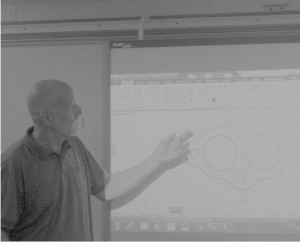
Down in the newly renovated design and technology lab, Technology Education teacher Michael Martin struggles with a decision to act on what he calls an “early retirement.”
This decision stems from recent alterations to the course offerings for the 2014-15 school year. Next year, the school will be offering a STEM (science, technology, engineering and math) class that includes units on aeronautical, electrical, mechanical and civil engineering. The class will replace Design and Technology, the introduction to engineering class that has been open to all grade levels in past years.
Martin based his decision to leave on this course change.
“I’ve watched, over the last decade, the loss of other programs at the school aimed at the general population in favor of programs that are aimed at what might be perceived as the top-performing population,” Martin said. “I don’t think it meets the needs of the student population in general.”
Although Design and Technology is being dropped, Martin maintains a favorable opinion of STEM classes in general.
“There’s no question that for a portion of the student population, the STEM concept is exceptional,” Martin said. “But it’s not for everybody, and it’s certainly not for everybody as they approach the ninth grade or the tenth grade. It needs to be available to everybody.”
Additionally, he said, the course offerings seem to be based on the monetary and budget concerns of the school.
“My concern is that from a course-offering point of view, systemic changes are being made that seem to continue to follow the dollars, and I don’t agree with it,” Martin said.
One of Martin’s main concerns with the new course is that it requires students to be committed to a STEM track as freshmen. This mindset, he said, limits options for students who aren’t sure where their academic interests lie.
Cutting Design and Technology “takes away a level of learning that might have inspired them to go that route in the future,” Martin said. “If you don’t arrive at Marshall with a future as an engineer, the way things are going, you’re never going to be exposed to the courses that might thus inspire you.”
Even with the problems that Martin sees with the alterations to the course offerings, he remains an advocate of the incoming classes.
“I fully support the presence of the IB class in the school; I fully support the presence of the STEM engineering class,” Martin said. “[But] I wouldn’t do it at the exclusion of the courses presently being offered.”
Martin’s retirement was a difficult topic to confront, especially as he is taking it earlier than he had originally planned.
“It’s just not the way I wanted it to be. You don’t become a teacher to look forward to retirement. It’s at least two years premature for me, and that’s the painful part,” Martin said. “I’m trying to reframe it as the gift that it might be.”
As Martin looks towards his retirement, he reflects back on what made him become who he is in the first place.
“I was born to be a teacher. I knew it when I was in the sixth grade, that this was my profession,” Martin said. “I’ve loved being at Marshall; I wouldn’t want to be anywhere else … It’s a wonderful community to have been able to serve.”
